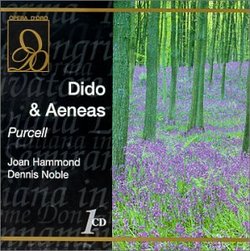| All Artists: Philharmonia String Orchestra and Chrous, Joan Hammond, Dennis Noble, Constant Lambert Title: Dido & Aeneas Members Wishing: 0 Total Copies: 0 Label: Opera D'oro Release Date: 11/16/1999 Genre: Classical Styles: Opera & Classical Vocal, Historical Periods, Baroque (c.1600-1750), Modern, 20th, & 21st Century Number of Discs: 1 SwapaCD Credits: 1 UPC: 723723670120 |
Search - Philharmonia String Orchestra and Chrous, Joan Hammond, Dennis Noble :: Dido & Aeneas
 | Philharmonia String Orchestra and Chrous, Joan Hammond, Dennis Noble Dido & Aeneas Genre: Classical
|
Larger Image |
CD Details |
CD ReviewsIndifferently Recorded and Unsuitably Cast. John Austin | Kangaroo Ground, Australia | 10/22/2000 (2 out of 5 stars) "Allegro Corporation have transferred this 1945 recording of Purcell's "Dido and Aeneas" to CD. The recording project originally occupied only one day, and it was sponsored by the British Council. Notable singers of the time on EMI's roster were engaged, the casting of Edith Coates as the Sorceress being especially successful. It was the second recording this opera had ever achieved. Even in its day, it received only qualified praise from critics. The chief complaints were that some of the singers were not always "in the style of the period" and that the sound quality was only mediocre. Well, these complaints still hold. Modern listeners might also quibble about the loudness of the harpsichord. The harpsichord had not long made it reappearance in 1945 in works of this period, and it was always deemed proper to amplify it like an electric guitar. Isobel Baillie's contributions command attention, as always, but she sounds a little flustered. Her high notes, and all the contributions from the chorus, have not been comfortably accommodated. All this has been provided for interested and prospective buyers because the accompanying notes give no information about the recording, apart from the cast list." Pure magic! John Austin | 03/23/2000 (5 out of 5 stars) "Purcell's Dido and Aeneas is pure magic, graceful, thoughtful, emotionally dense, and intellectually challenging. This recording is true to a clean and clear baroque aesthetic. It is so moving that it is one of the few baroque operas that non-opera lovers could love. To attest to its direct communication of emotional and intellectual angst and pleasure, Mark Morris in the late 1990's choreographed a ballet to this music and travelled the U.S. and Europe with great success. Interestingly, this music was originally written for performance at a girl's school, and although the performances on this recording left me amazed at the transcendent sound of the human voice, the pieces (especially the one that Dido sings as she dies of a broken heart) are singable and lyrical. This recording is for bleeding hearts as well as the intellectually critical listener."
|

 Track Listings (25) - Disc #1
Track Listings (25) - Disc #1